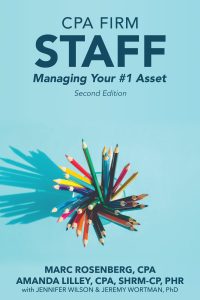The CPA Profession Needs to Embrace Apprenticeships
![]() Marc Rosenberg, CPA / Jan 16, 2024
Marc Rosenberg, CPA / Jan 16, 2024
The trigger for this blog is how CPA firms can resolve—or at least lessen—the dire shortage of staff in our profession, thereby easing the frustration that firms are experiencing by not having enough people to get the work out. In our blog “What CPA Firms Can Do to Ease the Staff Shortage,” posted Sept. 12, 2023, we list 12 tactics that could reduce the short supply of labor plaguing the CPA profession. Another tactic I would add to the list is apprenticeship programs.
What is an apprenticeship?
Apprenticeships combine paid on-the-job training with classroom instruction to prepare workers for highly skilled careers.
As you know, firms have long hired:
- Interns
- Paraprofessionals (some used to be called bookkeepers)
- Retired partners working part-time
What is the difference between an apprenticeship and an internship?
- Interns are college students who work for a CPA firm for a few short months. Firms spend time teaching the interns how to do accounting work and supervising them as they perform relatively simple client work. Internships have served CPA firms extremely well because the arrangement allows them to observe interns’ performance and use those evaluations when deciding whether or not to offer full-time jobs to the students after they graduate.
- Apprenticeships are for people who have little or no schooling or experience in accounting. They may or may not be college graduates. If not, their degrees are in fields other than accounting. The period of apprenticeship could be 2–3 years (at least, that’s what they were for trades in the old days). During this time, the firm teaches basic accounting to the apprentices and assigns them client projects that are closely supervised by a manager or partner.
Some firms have already started instituting a close equivalent of apprenticeship programs by hiring college graduates in fields other than accounting, such as finance, economics, management, and marketing.
The new, expanded second edition of our book, CPA Firm Staff: Managing Your #1 Asset, addresses ► talent management ► retention ► flexibility ►importance of the boss ►mentoring ► leadership development ► advancement ► performance feedback ►recruiting, and other issues.
Don’t apprentices and entry-level accounting grads need a solid, multi-year core education in accounting to do this work before they start working at a CPA firm?
The short answer, I believe, is not in all cases. Some of you will disagree with me. But hear me out.
My career started in the traditional way: I got a four-year degree in accounting, passed the CPA exam and joined Ernst & Young as an entry-level staff. There’s no question that I needed an education in the basics of accounting to do my job at E&Y. But what amazed me the most in my four years at Ernst was the substantial amount of on-the-job training I received. And they were paying me a generous starting salary while doing this! I left E&Y after four years. If someone had asked me then what was more important in learning how to do CPA firm work—my major in accounting or my on-the-job experience—the hands-down winner was the OTJ training. I would put it at 20% formal education and 80% OJT.
If I had majored in something other than accounting and was hired by E&Y or any other firm as an entry-level accountant/apprentice, I’m quite sure the firm could have taught me all I needed to learn. Plus, I was eager to learn, college-educated, and a hard worker, so I fulfilled the intangibles part of getting hired.
I’m not doubting for one second the tremendous value of a well-rounded college education that not only includes courses in your major but other subjects as well. What we learn from these courses is incalculable in terms of helping us enjoy successful careers.
But my point is this: Putting the above aside, can someone without an accounting degree perform CPA firm work if the firm teaches and mentors them well? I say yes; this is what an apprenticeship is all about. Firms should consider this strategy. The obvious caveat is that firms need to be a certain size before they can afford to devote time and resources to an apprenticeship program—perhaps $10M or more.
I want to be clear about this: I’m not suggesting hiring apprentices instead of accounting majors. Instead, the apprentice strategy should be used as a nice supplement to our efforts to hire and retain accounting majors.
Haven’t we all discussed with colleagues or thought in our heads that universities don’t teach their accounting majors what they need to do to start jobs at our firms? Things like:
- The discipline of working eight hours a day, every day, every week and not getting tired or bored with it
- The accounting and tax software that CPA firms use like we breathe air
- The preparation and organization of workpapers
- The application of what is learned in the classroom to real work; i.e., case studies with actual client information
- Using technology in our work
- Shadowing CPA firm seniors and managers on client projects
- Dealing with clients, peers, and supervisors
- Communication, writing and interpersonal skills.
A real-life example
I have led a Chicago roundtable for 25 years. Members are managing partners of the largest local CPA firms in the Windy City. About ten years ago, half a dozen firms got together and formed a group they called an intern program. The driving force was Allen Bolnick, managing partner of Weltman Bernfield (later merged with Top 20 firm Wipfli, from which Allen retired). He is now heading up a tax preparation firm with his son.
Calling that program an “internship” was a misnomer. It was more an intensive, 8–10 week university-level apprenticeship program for 25 accounting majors each year. It took an extraordinary amount of work from personnel at the six firms. In the end, the firms hired many of the interns and benefited from the knowledge that the students obtained.
I taught a session in the program each year on what a career in public accounting is all about, some of the performance metrics used to benchmark a CPA firm, and where the profession is headed. Last month, 11 years after I delivered this presentation to the intern group, I received an unsolicited email from one of the students in my class. Some of his comments were:
- I ended up being a CPA and have always appreciated your thoughts on things and where the profession is going.
- The profession has treated me well, and I am continually excited by all the changes that have occurred during my career.
- I like the medium-sized firm I’m working at better than the huge firm I joined initially. It fits my lifestyle and feels more community oriented. You’re out there meeting people and fixing problems.
- There was something about the way you delivered your message that made public accounting seem like an appealing career.
- I include this sentence not to toot my own horn, but to encourage partners at your firms to spend the time doing what I did with interns and hiring prospects.
Final remarks
The staff shortage problem is never going to go away by conventional means, which today, unfortunately, is mostly hoping the situation will go away on its own. Einstein’s definition of insanity is à propos: doing the same thing over and over and expecting a different result.
Firms need to do outside-the-box thinking. Apprenticeships are just one of many strategies that CPA firms can pursue to ease the labor shortage.
1 Comments

CPA Firm Staff: Managing Your #1 Asset, Second Edition
New Second Edition! In an era of tight labor supply and high turnover, the old ways of managing staff no longer work. Today’s firms need to address retention, staff engagement, recruiting, training, mentoring, recognition, leadership development, advancement, performance feedback and work-life balance; here’s your complete guide.
Learn More
Great article, we at Mahoney, in St Paul, Minnesota have hired Junior Associates for the last few years. Some will continue their education in accounting and sit for the CPA exam, and some will not. They are all doing important work for us and have a place at our firm for the long haul.
We have to change from to old ways, or we will not succeed!